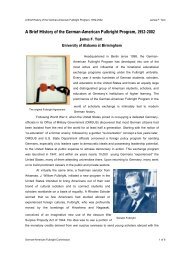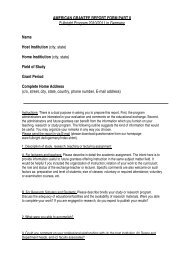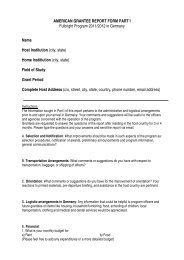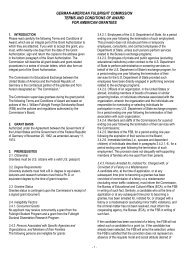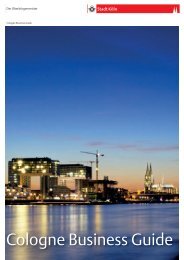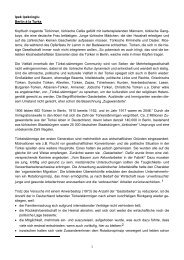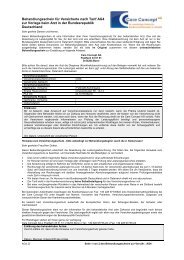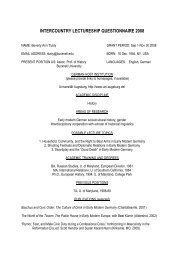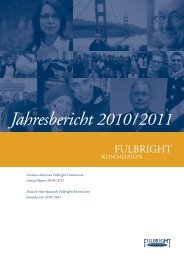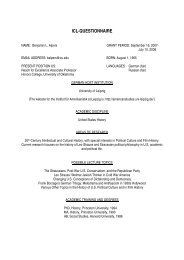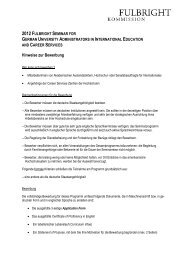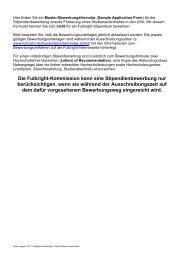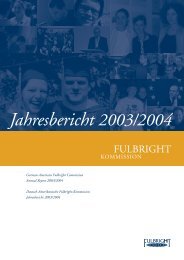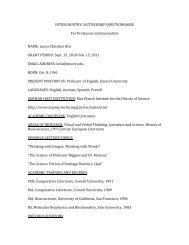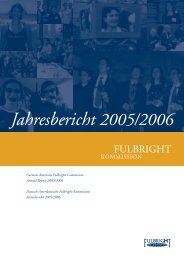Funnel 40/2, Inhalt - Fulbright-Kommission
Funnel 40/2, Inhalt - Fulbright-Kommission
Funnel 40/2, Inhalt - Fulbright-Kommission
You also want an ePaper? Increase the reach of your titles
YUMPU automatically turns print PDFs into web optimized ePapers that Google loves.
FROM OUR FULBRIGHTERS 33<br />
Sorting Trash to Save the World<br />
A look at the effect of personal responsibility and government<br />
legislation on environmentalism in Germany<br />
by Nicole Harkin<br />
Though many Americans, when polled, express concern<br />
with preserving the environment, the average American<br />
complicitly promotes the environment’s further degradation.<br />
I consider myself an average American. I once drove a<br />
Chevrolet Suburban daily, and to be perfectly honest, I would<br />
enjoy another one even though I know that SUVs guzzle gas and<br />
pollute the air with hydrocarbons.<br />
The inner struggle between the desire to save the environment<br />
and the appeal of over consumption brought me to Germany,<br />
because even though I study environmental law, I still lack an<br />
understanding of how to behave in a way that is more conscious<br />
of my environmental impact. Germans, on the other hand, separate<br />
their trash into five different categories and one out of every<br />
eight belongs to an environmental organization or nature group.<br />
I hoped Germany would be a type of environmental haven after<br />
having been disillusioned while studying environmental law.<br />
I attend arguably the best environmental law school in the<br />
United States, Pace University School of Law in New York. One<br />
would expect that a school committed to churning out environmental<br />
lawyers charged with saving the world would set an example<br />
of environmental friendliness for its students. This is not the<br />
case. For example, when I first visited Pace the number of recycling<br />
bins on campus greatly impressed me. After starting school<br />
we learned that the school recycles nothing. The bins are there<br />
merely for show. However, I can hardly find fault with the Pace<br />
administration for their lack of environmental friendliness because<br />
our culture and economy are not conducive to making environmentally<br />
responsible choices.<br />
In Germany I research how Germany as a nation actively<br />
improves the environment. I look at recycling and urban sprawl<br />
control techniques, two areas in which Germany has played a pioneering<br />
role. In 1991 Germany passed the Packaging Ordnance<br />
(Verpackungsverordnung) requiring manufacturers to dispose of<br />
containers, bottles, and similar products at the end of the useful<br />
life of the packaging. Rather than stipulating how the law would<br />
be implemented, the German government allowed the packaging<br />
industry to regulate itself, leading to a system in which producers<br />
purchase a percentage of the recycled waste from the recycling<br />
companies. This percentage should theoretically correspond to the<br />
amount of packaging<br />
waste produced thus<br />
encouraging manufacturers<br />
to generate<br />
less waste. Not only<br />
has the amount of<br />
waste packaging produced<br />
been reduced by<br />
18% but Germany also<br />
goes a step further and recycles<br />
70% of all paper, 75% of<br />
all glass, and 60% of all aluminum.<br />
In existence for a much longer time<br />
than the recycling laws, Germany’s land use system hails from the<br />
turn of the 20th century. In fact, Germany founded modern urban<br />
planning and continues as a vanguard through the federally organized<br />
land use law (Bundesraumordnungsgesetz). The German Constitution<br />
stipulates that each state or Bundesland formulates a<br />
state-wide land use plan. Within each state different land areas are<br />
designated for growth or preservation.<br />
Each municipality must then formulate a growth plan with<br />
these designations in mind. The preservation of undeveloped land<br />
on the edge of cities (Außenbereich) is of the utmost importance<br />
and explicitly supports the public policy of preserving as much<br />
undeveloped land in Germany as possible. Germany’s dense population<br />
(82 million people in a country slightly smaller than the<br />
state of Montana) may partially explain the strong public policy<br />
position in favor of non-development even at the expense of the<br />
economy.<br />
Empirical studies in the U.S. show convenience and cost as the<br />
main indicators as to whether a person will participate in environmentally<br />
aware activities. I would argue that these factors provide<br />
the key to German environmental friendliness. Germans may<br />
or may not be more disposed to protecting the environment than<br />
Americans, but being environmentally friendly is easier and substantially<br />
more cost-effective in Germany.<br />
For example, in Germany owning a car creates many more<br />
inconveniences than in the U.S. The smaller German cities contain<br />
comparably fewer parking spaces. The cost of gasoline is high-<br />
THE FUNNEL • VOLUME <strong>40</strong> • NUMBER 2 • SUMMER 2004



